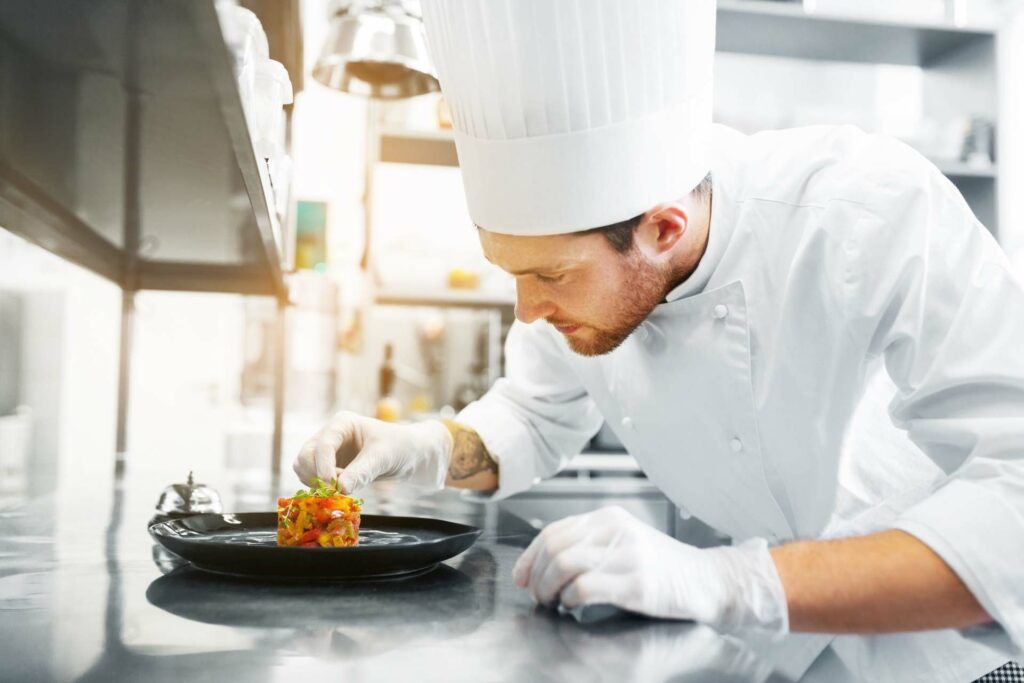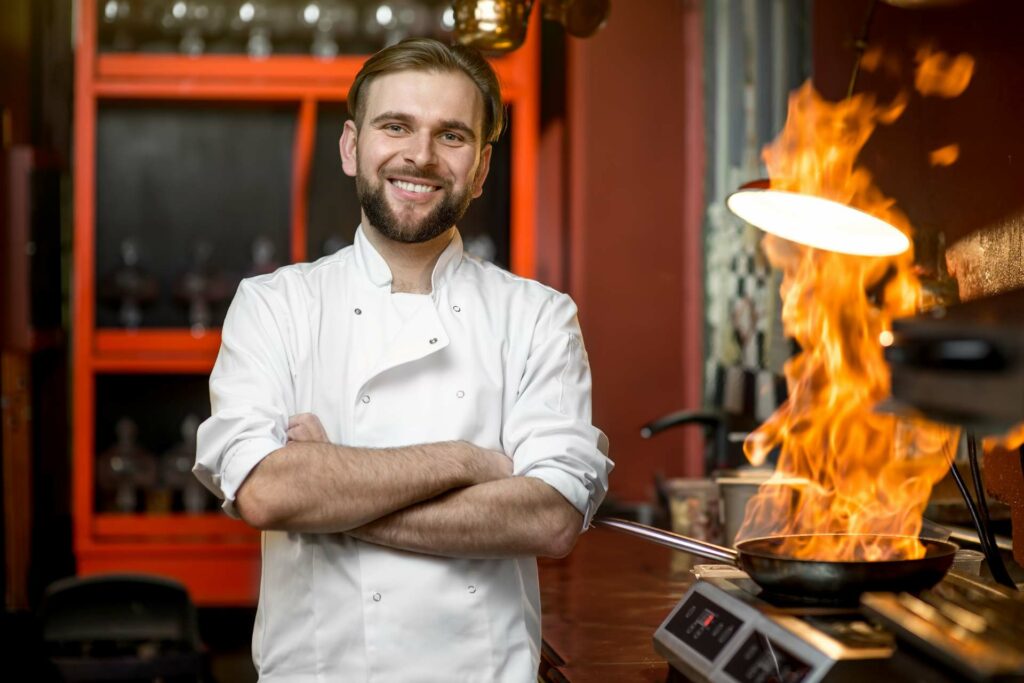1st catering & events app that matches employers and employees.

1 / Understand the offer and the establishment
When applying for a head chef position, the crucial first step is to understand the job offer in depth and the establishment for which you wish to work. This understanding goes far beyond simply reading the job requirements; it involves immersion in the culture, values and history of the establishment, as well as an analysis of the underlying expectations behind the offer.
Detailed analysis of the chef job offer applied for
Each job posting for a chef reveals clues about what the establishment is looking for. The terms used, the style of the text and the skills required provide valuable information about the type of leader the establishment hopes to attract. Carefully analyze the offer to understand not only the technical skills required, but also the personal and professional qualities valued by the establishment. Look for clues about the style of cooking, the level of creativity expected and the degree of team management involved.
Understand the culture of the establishment
The culture of a restaurant establishment is a key factor that influences not only your daily life as a chef, but also your ability to succeed and thrive in that environment. Find out about thehistory of the restaurant or hotel, its positioning on the market, its target clientele and its reputation. Online reviews, news articles, and testimonials from current and past customers or employees can offer valuable insights.
Cooking style and culinary expectations
A restaurant's cooking style largely determines the culinary expectations and the type of skills sought in a chef. Whether the establishment specializes in haute cuisine, traditional cuisine or avant-garde creations, align your skills and experiences with this style. Show how your background and your culinary approach can enrich and innovate the establishment's gastronomic offering.
Understand the challenges and opportunities of the position
Each establishment has its own challenges and opportunities. This could be modernizing a traditional menu, introducing sustainable practices, or managing a diverse team. Understanding these aspects will allow you to present solutions and innovative ideas in your application and during the interview. This demonstrates not only your analytical ability, but also your proactivity and commitment to the success of the establishment.
Alignment with the establishment’s values
Finally, make sure that your personal and professional values are in line with those of the establishment. A chef succeeds not only through his technical skills, but also by being in harmony with the philosophy and values of the place where he works. Whether the establishment emphasizes innovation, tradition, sustainability or service excellence, your ability to share and embody these values will be a major asset.
By thoroughly understanding the job posting and the establishment, you will be able to prepare a thoughtful and targeted application, which highlights not only your culinary skills, but also your ability to contribute meaningfully to the team and the overall culinary experience of the establishment.

2/ Personalize CV and cover letter
When responding to a job posting for a chef position, personalizing your CV and cover letter is crucial. These documents are your first ambassadors to the potential employer and should reflect not only your professional expertise, but also your ability to align with the specific needs of the establishment.
Adapt your CV to the specific chef offer
Your CV should be tailored to each position you are applying for. Start with highlight experiences and skills which are directly relevant to the offer. For example, if the job posting emphasizes creativity in menu design, be sure to highlight experiences where you demonstrated this skill. Use keywords present in the job offer to ensure that your CV resonates with the employer's expectations.
Importance of the cover letter
The cover letter is your chance to tell your story and show your passion for cooking. It should complement your CV by offering a more personal and detailed insight into your skills and culinary approach. Customize each cover letter for the institution you are applying to, showing that you have done research and understand its culture and goals.
Concrete examples and achievements
In your CV and cover letter, use concrete examples of your achievements. If you have helped increase sales at your current or previous restaurant, or have been recognized for your culinary excellence, mention it. These tangible examples of success can greatly strengthen your application.
Show adaptability and evolution
Employers are looking for leaders who don't just follow trends, but who are able to adapt and evolve. Highlight in your CV and cover letter how you have developed new skills, adapted your style or adopted new culinary technologies. This demonstrates your ability to grow with the establishment.
Structure and clarity at every stage of the application!
Make sure your CV and cover letter are clear and well structured. Information should be easily accessible and presented in a professional manner. Employers often receive numerous CVs and cover letters; a well-organized, easy-to-read document will make your application stand out.


4/ Chef job offer: preparation for the interview
The interview is a decisive step in the recruitment process for a chef position. This is your opportunity to make a lasting impression and demonstrate in person why you are the ideal candidate for the role. Careful preparation is therefore essential to maximize your chances of success.
In-depth research on the establishment
Start by performing a in-depth research on the establishment. Understand its culture, history, customer base, cooking style and market position. This knowledge will allow you to answer interview questions more meaningfully and show your genuine interest in the position. Visit the establishment's website, read reviews, and familiarize yourself with their menu and special offers.
Anticipate interview questions
Think about potential questions the employer might ask. This includes questions about your past experiences, your kitchen management skills, your culinary style, and how you handle stressful or conflicting situations. Prepare detailed and specific answers, using concrete examples drawn from your professional experience.
Highlight your skills
Be prepared to talk about your skills and accomplishments. Prepare a portfolio if necessary, with photos of your dishes, menus you have created, or restaurant reviews. This will give a tangible insight into your talent and creativity in the kitchen.
Communication and presentation
The interview is also an assessment of your communication skills and personal presentation. Practice clear, confident communication. Choose professional attire that reflects the level of formality of the establishment. Your appearance should show that you are a serious and well-groomed professional.
Questions to ask the employer
Prepare some questions to ask the employer. This may include questions about the kitchen team, menu and service expectations, or specific challenges of the establishment. This shows your commitment and interest in the role.
Managing stress and anxiety
Finally, find strategies to manage stress and anxiety before and during the interview. Breathing techniques, a good night's sleep before the interview, and arriving early can help you stay calm and focused.
For additional tips on catering interview preparation, visit Palace Journal, an authority site that offers valuable resources for hospitality and restaurant professionals.
By preparing carefully for the interview, you will be able to best demonstrate your passion for cooking, your fit with the establishment and your skills as a chef. This is your time to shine and convince the employer that you are the right choice for the job.

5/ Build and use your professional network
In the catering industry, and particularly for chefs, the professional network plays a crucial role. It can open doors to new opportunities, provide valuable advice, and even help navigate career challenges. Building and maintaining a strong network takes time and effort, but the rewards can be significant.
Importance of the network in catering
Networking in the restaurant world isn't just a way to find a job; it is a professional community that offers support, inspiration and opportunities for growth. Strengthen your network means building relationships with colleagues, mentors, suppliers, and even competitors. Every interaction can be an opportunity to learn and share experiences.
Start with your environment
Your current network is the best starting point to hear about a chef job offer. Maintain good relationships with your colleagues, including those in other departments, such as front of house. Participate actively in the life of the establishment and show a sincere interest in the projects and challenges of your colleagues.
Attend industry events
Trade shows, cooking competitions, workshops and seminars are great opportunities to meet industry professionals. These events not only allow you to stay informed of the latest trends and innovations, but also to meet people who share your interests and passions. Don't forget to exchange contact details and follow up after the events.
Use social media and online platforms
Social media and professional online platforms, like LinkedIn, are powerful tools for expand your network. Share your experiences, your culinary creations, and participate in online discussions. This can help you gain exposure and make connections beyond your local circle.
An Extra is the first App that connects employers and employees in the hotel and catering industry, an essential download!
Building lasting relationships
Networking isn't just about making new contacts; it’s also about maintaining long-term relationships. Stay in touch with former colleagues, employers and mentors. A simple message or a casual encounter can be enough to maintain a strong connection.
Be active in the local community
Your local community also provides networking opportunities. Participate in local events, farmers markets, or get involved in community initiatives. These activities strengthen your local presence and show your commitment to your community.
By investing time and effort to build and maintain a strong professional network, you will open doors to new opportunities and strengthen your position in the restaurant industry. A well-maintained network can be one of your most valuable resources throughout your career.

By approaching your job search with these strategies in mind, you will position yourself as a candidate of choice for chef positions.
Every step, from understanding the offer to preparing for the interview, is an opportunity to demonstrate your passion, expertise and uniqueness as a leader. With these tips, you'll be well-equipped to stand out in the restaurant industry and seize the opportunity to run a kitchen with skill and creativity.



